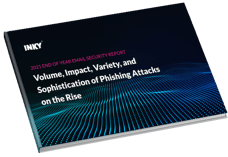If there is one thing spreading faster than the pandemic, it’s cybercrime. Hackers are feeding off of the world’s anxiety over the Coronavirus and taking advantage of consumers, companies, and employees. Google alone reported seeing 18 million COVID-19 malware and phishing emails in just one day.1 It’s apparent that the virus has turned out to be the perfect ruse for cybercriminals in 2020, and annual losses due to phishing schemes this year could be astronomical.
Whether you’re an IT manager or a business owner, you should be aware of what is happening in the world of cybercrime during the pandemic. Here are a few COVID-19 cybersecurity facts you should consider, remembering that the pandemic still has no clear end in sight.
- Malware, spyware and trojans have been found embedded in interactive coronavirus maps and websites.2
- Cybercriminals are creating thousands of new phishing sites every day in order to reel unsuspecting victims into their phishing scams.2
- Hospitals, medical centers, and public institutions are being targeted by cybercriminals for ransomware attacks. The health crisis has made them particularly vulnerable since they are overwhelmed and cannot afford to be locked out of their systems.2
- Before the pandemic, the FBI’s Internet Crime Complaint Center received about 1,000 cybercrime complaints per day. They are now receiving 3,000 to 4,000 per day.3
- A volunteer coalition of cyber experts was formed to fight COVID-19 threats and they alone have taken down 3,000 malicious websites that included impersonations of the World Health Organization, the United Nations and the CDC.3
- The FBI has warned the public that not only have cybercriminals been preying on the first responders, elderly and the isolated, but these same groups will target businesses and individuals working from home via new Business Email Compromise4
How serious is this current wave of COVID-related cybercrime? Bad enough that policymakers have been urged to address the current gaps in our nation’s cybersecurity. In a letter to Congressional leaders and the Office of Budget and Management, technology trade associations asked for new provisions to be implemented into the Coronavirus Aid, Relief, and Economic Security (CARES) Act and future stimulus relief efforts, in order to better protect individuals and companies from these acts of crime.5
Will waiting for this legislation to pass help your organization? The obvious answer is no. Act now. Last year, $6,659 was lost to cybercrime every minute.6 Just think what the costs will be for 2020. By protecting your company and its employees now, you help ensure that you are not the one contributing to the constantly escalating cybercrime price tag.
Take the best step forward. Safeguard your company during the pandemic and beyond by choosing the best email security service. INKY® provides the most comprehensive malware and email phishing protection available…catching malicious emails before they can be opened or downloaded. INKY scans every sent and delivered email automatically and flags malicious emails, protecting you and your company from even the most complex threats.
You’re doing what you can to protect yourself and your employees from the evils of the Coronavirus. Now is the time to be just as diligent in your efforts to protect your company. Schedule a demo or inquire today.
----------------------
INKY® is the emerging hero in the war against phishing. An award-winning cloud-based email security solution, INKY® prevents the most complex phishing threats from disrupting or even immobilizing your company’s day-to-day business operations. Using computer vision, artificial intelligence, and machine learning, INKY® is the smartest investment you can make in the security of your organization. INKY® is a proud winner of the NYCx Cybersecurity Moonshot Challenge and finalist in the 2020 RSAC Innovation Sandbox Competition. Learn more about INKY® or request an online demonstration today.
2Source: https://www.interpol.int/en/Crimes/Cybercrime/COVID-19-cyberthreats
6Source: https://www.fbi.gov/news/stories/2019-internet-crime-report-released-021120



